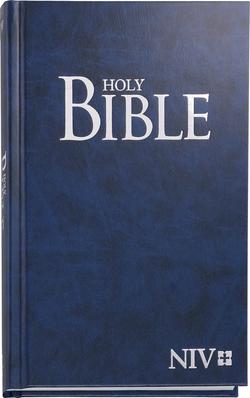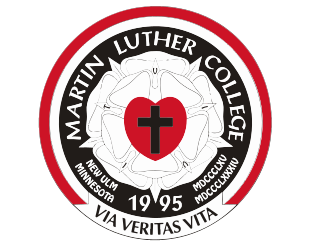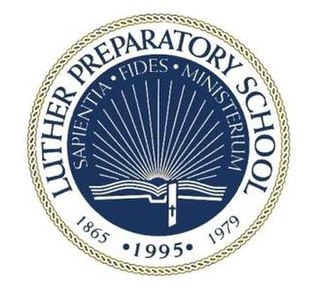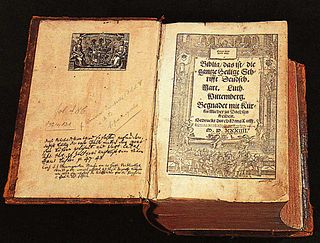
The New International Version (NIV) is a translation of the Bible into contemporary English. Published by Biblica, the complete NIV was released on October 27, 1978 with a minor revision in 1984 and a major revision in 2011. The NIV relies on recently-published critical editions of the original Hebrew, Aramaic, and Greek texts.

Today's New International Version (TNIV) is an English translation of the Bible which was developed by the Committee on Bible Translation (CBT). The CBT also developed the New International Version (NIV) in the 1970s. The TNIV is based on the NIV. It is explicitly Protestant like its predecessor; the deuterocanonical books are not part of this translation. The TNIV New Testament was published in March 2002. The complete Bible was published in February 2005. The rights to the text are owned by Biblica. Zondervan published the TNIV in North America. Hodder & Stoughton published the TNIV in the UK and European Union.

The Lutheran Church – Missouri Synod (LCMS), also known as the Missouri Synod, is a confessional Lutheran denomination in the United States. With 1.7 million members as of 2022 it is the second-largest Lutheran body in the United States, behind the Evangelical Lutheran Church in America. The LCMS was organized in 1847 at a meeting in Chicago, as the German Evangelical Lutheran Synod of Missouri, Ohio, and Other States, a name which partially reflected the geographic locations of the founding congregations.

The Wisconsin Evangelical Lutheran Synod (WELS), also referred to simply as the Wisconsin Synod, is an American Confessional Lutheran denomination of Christianity. Characterized as theologically conservative, it was founded in 1850 in Milwaukee, Wisconsin.

The English Standard Version (ESV) is a translation of the Bible in contemporary English. Published in 2001 by Crossway, the ESV was "created by a team of more than 100 leading evangelical scholars and pastors." The ESV relies on recently published critical editions of the original Hebrew, Aramaic, and Greek texts.

The Church of the Lutheran Confession (CLC) is a conservative Christian religious body theologically adhering to confessional Lutheran doctrine. Founded in 1960 in Minnesota, it has approximately 85 congregations in 24 U.S. states, and missions in Canada, India, Africa, Nepal, and Myanmar.

The Evangelical Lutheran Synod (ELS) is a US-based Protestant Christian denomination based in Mankato, Minnesota. It describes itself as a conservative, Confessional Lutheran body. The ELS has 130 congregations and has missions in Peru, Chile, India, South Korea, Ukraine, Czech Republic, and Latvia.

Martin Luther College (MLC) is a private Lutheran college in New Ulm, Minnesota. It is operated by the Wisconsin Evangelical Lutheran Synod (WELS). Martin Luther College was established in 1995, when Northwestern College (NWC) of Watertown, Wisconsin, combined with Dr. Martin Luther College (DMLC) of New Ulm on the latter's campus.

The Evangelical Lutheran Synodical Conference of North America, often known simply as the Synodical Conference, was an association of Lutheran synods that professed a complete adherence to the Lutheran Confessions and doctrinal unity with each other. Founded in 1872, its membership fluctuated as various synods joined and left it. Due to doctrinal disagreements with the Lutheran Church–Missouri Synod (LCMS), the Evangelical Lutheran Synod (ELS) and the Wisconsin Evangelical Lutheran Synod (WELS) left the conference in 1963. It was dissolved in 1967 and the other remaining member, the Synod of Evangelical Lutheran Churches, merged into the LCMS in 1971.

Luther Preparatory School is a residential four-year secondary school located in Watertown, Wisconsin, United States. Established in 1865, it is owned and operated by the Wisconsin Evangelical Lutheran Synod (WELS). LPS focuses on preparing students to become WELS pastors and teachers and to continue their education at Martin Luther College (MLC), a WELS college in New Ulm, Minnesota. Curriculum at LPS focuses on the liberal arts and religious studies.

The Luther Bible is a German language Bible translation by the Protestant reformer Martin Luther. A New Testament translation by Luther was first published in September 1522; the completed Bible contained 75 books, including the Old Testament, Apocrypha and New Testament, which was printed in 1534. Luther continued to make improvements to the text until 1545. It was the one of first full translations of the Bible into German that used not only the Latin Vulgate but also the Greek.

The Evangelical Lutheran Hymnary (ELH) is a hymnal created by the Evangelical Lutheran Synod in 1996.
"God's Word Is Our Great Heritage" is the title of a popular hymn sung in many churches, especially the Lutheran Church. This hymn was inspired by Psalm 16:6: "...yea, I have a goodly heritage."KJV

The official translation used by the state church, the Evangelical Lutheran Church of Finland, is approved by its Synod. There have been three official translations: Biblia, se on Coco Pyhä Ramattu Suomexi (1642), Pyhä Raamattu (1933/1938), and the current one Uusi kirkkoraamattu (1992/2007). The term kirkkoraamattu means that the edition has to be suited for service of worship and other needs of the church.
Lutheranism is a major branch of Protestantism that identifies primarily with the theology of Martin Luther, the 16th-century German monk and reformer whose efforts to reform the theology and practices of the Catholic Church launched the Reformation in 1517. Lutheranism subsequently became the state religion of many parts of Northern Europe, starting with Prussia in 1525.

A Protestant Bible is a Christian Bible whose translation or revision was produced by Protestant Christians. Typically translated into a vernacular language, such Bibles comprise 39 books of the Old Testament and 27 books of the New Testament, for a total of 66 books. Some Protestants use Bibles which also include 14 additional books in a section known as the Apocrypha bringing the total to 80 books. This is in contrast with the 73 books of the Catholic Bible, which includes seven deuterocanonical books as a part of the Old Testament. The division between protocanonical and deuterocanonical books is not accepted by all Protestants who simply view books as being canonical or not and therefore classify books found in the Deuterocanon, along with other books, as part of the Apocrypha. Sometimes the term "Protestant Bible" is simply used as a shorthand for a bible which contains only the 66 books of the Old and New Testaments.

Christian Worship: A Lutheran Hymnal (CW) is a hymnal of the Wisconsin Evangelical Lutheran Synod (WELS) published in 1993. It was prepared by the WELS Commission on Worship and published by Northwestern Publishing House, the official publisher of the WELS.












